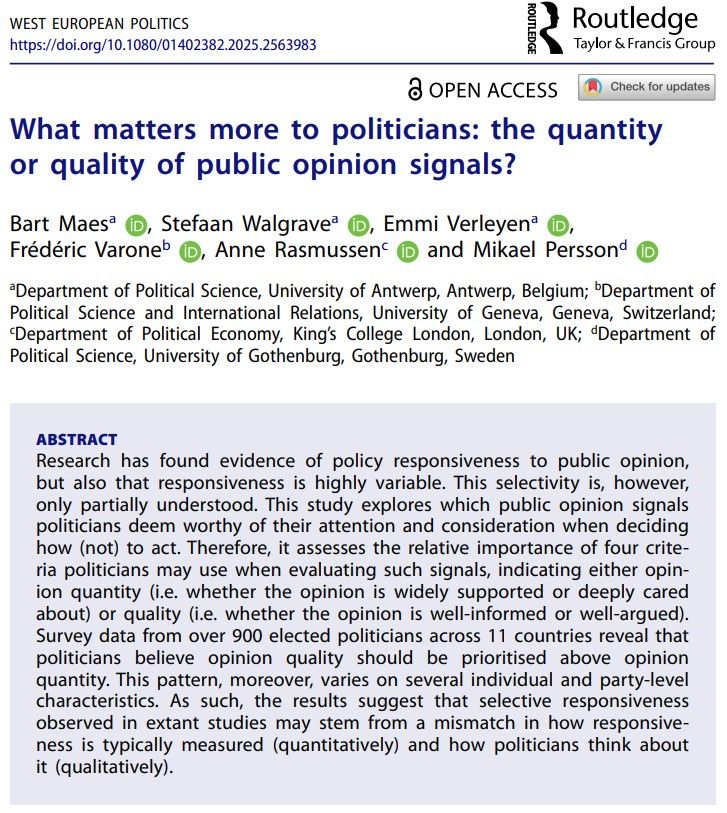
Prof of Pol Science @kingscollegelondon.bsky.social
University of Copenhagen. Lobbying | Political Representation | Public Opinion & Policy | Gender | Social Media | EIC @igajournal.bsky.social | PI ADVODID ERC Grant |ECPR ExecComm
https://annerasmussen.eu ..
more
Prof of Pol Science @kingscollegelondon.bsky.social
University of Copenhagen. Lobbying | Political Representation | Public Opinion & Policy | Gender | Social Media | EIC @igajournal.bsky.social | PI ADVODID ERC Grant |ECPR ExecComm
https://annerasmussen.eu

More in this [1/14]
Reposted by Anne Rasmussen, Justin H. Kirkland, David R. Miller

Reposted by Anne Rasmussen, Tom Louwerse

➡️ doi.org/10.1177/1532...

📚 Three volumes
⭐ 431 entries
🎓 581 wonderful authors from across the world
A very short 🧵

Reposted by Anne Rasmussen

KV2021 var 21 ud af 98 borgmestre kvinder. Lad os se hvad der sker med de sidste poster... #dkpol #KV2025
www.dr.dk/nyheder/poli...
Reposted by Anne Rasmussen

Better methods won’t eradicate the slot machine.
Put the tools to the use of theory.
Thanks to @lseimpactblog.bsky.social for featuring my post.
blogs.lse.ac.uk/impactofsoci...
Reposted by Anne Rasmussen, Robert Huber

This cross-national study across 🇨🇦🇩🇰🇮🇱🇳🇱🇨🇭 explores #Representation and how honesty-humility and other HEXACO personality traits shape people’s ambition to run for office 🧵1/2
buff.ly/xk4qMa3
Reposted by Anne Rasmussen

Too honest and humble to run for office? Citizens’ personality traits, nascent ambition, and recruitment - https://cup.org/4ncO4c0
- Marc van de Wardt, P.Bundi, P.J.Loewen, @annerasmussen.bsky.social, @liorsheffer.bsky.social & F.Varone
#FirstView
Reposted by Ruth Dassonneville, Anne Rasmussen, Klaus H. Goetz


Politicians’ perceptions of public opinion appear more closely linked to who they are than to who they talk to
Full paper here: 🔗 doi.org/10.1086/734528
10/10
⚠️Worrying, because many politicians soften simply see the public as a mirror of themselves.
✅Reassuring, because centrist politicians—often in government—should be more likely to get majority opinion right.
9/10
-Misperceptions are widespread
-They are most strongly associated with self-projection - Interest groups play a more modest, indirect role
This suggests that getting representation “right” depends more on curbing projection than on changing group contacts
8/10


If interest groups matter, their influence is mostly indirect—by shaping politicians’ own views, which in turn are associated with their (biased) perceptions of citizens.
7/10
Links to business groups are associated with less accurate perceptions—but not with systematic bias
Interactions with citizen groups show little connection to either accuracy or bias of perceptions
So, interest groups likely matter less than often feared.
6/10
Politicians’ estimates move systematically toward their own views:
(1)Right-wing politicians think the public is more right-wing.
(2) Left-wing politicians think the public is more left-wing.
“False consensus” in action.
5/10
- information from
- contact with, and
- (various forms of) engagement in interest groups.
And we measure at both the accuracy of and ideological bias in perceptions of public opinion
4/10
(1) Self-projection – politicians assume the public thinks like they do.
(2) Interest groups – ties to business or citizen groups correlate with perceptions.
3/10

On average, politicians misestimate support by 22 percentage points (!).
BUT biases vary a lot (!) by issue & country.
2/10

Why do politicians often misperceive what citizens' policy positions are?
@simonotjes.bsky.social and I study ~10,000 estimates of public opinion by politicians in Denmark & the Netherlands to uncover the sources of these (mis)perceptions
Thread 🧵1/10
Reposted by Anne Rasmussen, Christian Breunig

www.tandfonline.com/doi/full/10....


